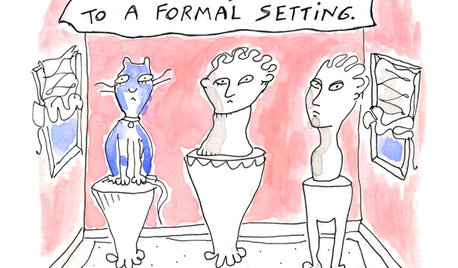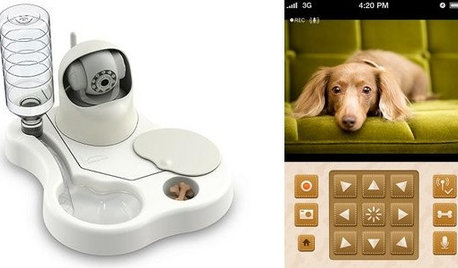update in bizarre cat behavior
bizabet
13 years ago
Related Stories

HEALTHY HOMEHow to Childproof Your Home: A Grandmother’s Wisdom
Change kids’ behaviors, not your entire house, to keep the designs you like and prepare children for reality
Full Story
MOST POPULAR7 Ways Cats Help You Decorate
Furry felines add to our decor in so many ways. These just scratch the surface
Full Story
REMODELING GUIDESHouzz Tour: Updating a Midcentury Aerie in the Berkeley Hills
The setting was splendid; the house, not so much. Now the two are right in line, with high quality to spare
Full Story
HOME TECHTo Feed and Protect: Care for Your Pet From Afar With New Devices
You might miss the nuzzles, but your dog or cat won't miss food, water or monitoring with these high-tech feeders and cameras
Full Story
BATHROOM MAKEOVERSRoom of the Day: Master Bath Gets an Elegant Remake
A once-dated bathroom blends traditional style with modern updates and distinctive tilework
Full Story
HOUZZ TOURSMy Houzz: Collective Spirit in a Boho Bungalow
Ethnic textiles, vintage furniture and vignettes galore show a Dallas stylist's hunter-gatherer side at its best
Full Story
HOUZZ TOURSMy Houzz: Art and Lucky Finds Fill an Airy New House
Bicycle wheels, wire hangers, IV drips ... anything can become furniture in this artistic family's home
Full Story
SELLING YOUR HOUSEHow to Stage Your Kitchen for a Home Sale
Attract buyers with a kitchen that’s clean, bright and welcoming — no expensive overhaul required
Full Story
DECORATING GUIDESGive That Coffee Table an Extra Shot of Style
Corral necessities neatly or add an eye-catching base for display with a tray that sets off your table or ottoman
Full Story
HOUZZ TOURSMy Houzz: Hard Work Pays Off in a DIY Cottage Renovation
First-time homeowners roll up their sleeves and give their midcentury Montreal home an infusion of style and personality
Full StorySponsored
Columbus Design-Build, Kitchen & Bath Remodeling, Historic Renovations
More Discussions








Meghane
bizabetOriginal Author
Related Professionals
Asbury Park Architects & Building Designers · Universal City Architects & Building Designers · Hilton Head Island Furniture & Accessories · Tucson Furniture & Accessories · Carlsbad Furniture & Accessories · Chaska Furniture & Accessories · Sahuarita Furniture & Accessories · Wildomar Cabinets & Cabinetry · Beaumont Flooring Contractors · Camp Verde Flooring Contractors · Gilroy Flooring Contractors · Lawndale Flooring Contractors · Louisville Flooring Contractors · Madison Flooring Contractors · Stoughton Flooring ContractorsbizabetOriginal Author
laurief_gw
bizabetOriginal Author
fandlil
laurief_gw
lzrddr
laurief_gw
bizabetOriginal Author